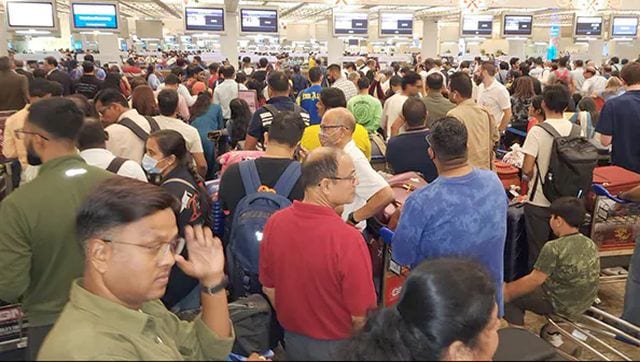Terminal Trouble: The two-hour chaos that brought Mumbai International Airport to a crawl
“Sitting in the plane for close to an hour now!! Still no clue when we will take off. Crazy chaos at Mumbai airport.”
This tweet by a flyer on Thursday in Mumbai summed up the experience of thousands of people, who were at Mumbai Airport’s T2 terminal after a network cable fault led to inordinate delays.
What exactly happened at Chhatrapati Shivaji Maharaj International Airport? How were passengers affected? How long before services resumed normalcy? We take a closer look and give you all the answers.
Chaos unleashed
Around 6 pm on Thursday, people began to flood Twitter with complaints of complete chaos at Mumbai Airport’s Terminal 2. Passengers faced a tough time in completing the check-in process for their flights as the Internet server at the facility went down for over two hours.
Airlines had to issue boarding passes manually, leading to long queues and people getting frustrated and angry. Visuals flooded social media showing huge queues at all counters for baggage drop during the down period.
Mumbai airport server is down from past 2 hours no flights taking off. We are sitting idle for an hour in Delhi bound flight @CPMumbaiPolice hope it’s not a cyber attack in view of G20 Summit. 2 hours is a long time. @republic @ZeeNews #G20Presidency @narendramodi @AmitShah
— Ahàm Bràhmasmī (@Vedchetan) December 1, 2022
A passenger shared his experience at the airport, the second busiest after the one in Delhi, on Twitter. “Got in after waiting for close to one and half hour at the baggage drop counter,” he wrote, cautioning other passengers about flying from Mumbai on Thursday.
Terrible situation in Mumbai T2 Airport at the moment. Server failure. Full chaos. If you're flying from Mumbai today, exercise caution. Got in after waiting for close to one and half hour at the baggage drop counter. #MumbaiAirport
— Bastab K Parida (@ParidaBastab) December 1, 2022
Another flyer claimed that the systems went down just as she was getting her bags checked-in.
The sheer timing of you placing your bag for check in and all systems going down at that exact moment at Mumbai Airport @CSMIA_Official! 😶
Complete standstill and this is how we begin the weekend!
— Ritu Mittal Mukherjee (@ritu__mukherjee) December 1, 2022
Officials speak
As passengers faced a tough time at the airport, authorities from the Chhatrapati Shivaji Maharaj International Airport (CSMIA) said that a network interruption had caused a disruption in the ticketing systems.
“There was a network interruption resulting from a cable cut during some construction work in the city. This interrupted the various ticketing systems,” said CSMIA officials.
It is reported that the ongoing infrastructure digging work for the Mumbai Metro line in the vicinity of the airport had caused a snap in the cable of a major utility company, leading to the chaos at the airport.

It was only after 7 pm, almost two hours since the systems had gone down, that services resumed normalcy, providing passengers with some relief.
Soon after the system blackout, airport officials initiated steps to ensure least possible inconvenience to the flyers.
Vistara, Akasa Air and Air India confirmed that their services had been impacted and apologised to flyers for the inconvenience.
An Akasa Air spokesperson had confirmed that their services from Mumbai airport had been impacted. “We are assisting passengers according to their needs,” said the spokesperson.
Air India issued a statement that read: “We understand that delays are certainly uncomfortable. Our team is working diligently to minimise the inconvenience. They'll be in touch with you for further updates.”
Importance of internet at airports
Thursday’s chaotic scenes at Mumbai Airport is a reminder of how dependent airports are on the internet.
From ticketing to baggage to billing to boarding — all of these aspects and many more activities at the airport are dependent on the internet. Airports across the world depend on a combination of smart management techniques, good data analysis, and a state-of-the-art technology infrastructure.
Many aviation experts also believe that intelligent airport networks, built on strong 5G, will help revolutionise the passenger experience, as ground operations, security checkpoints, runway monitoring, baggage handling, and building management could be transformed in the near future.
With inputs from agencies
Read all the Latest News, Trending News, Cricket News, Bollywood News,
India News and Entertainment News here. Follow us on Facebook, Twitter and Instagram.
from Firstpost India Latest News https://ift.tt/4vFEIJ8
FP Explainers
Comments
Post a Comment